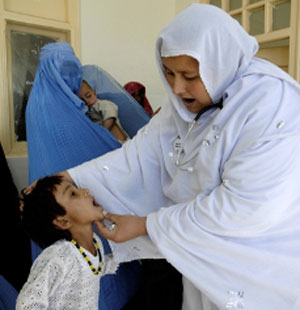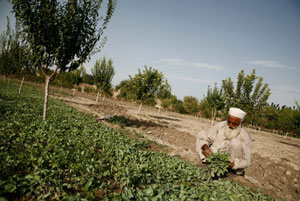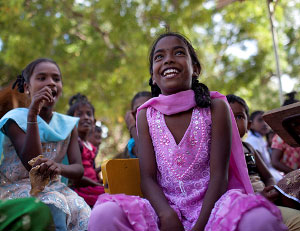A child undergoes health checks in Uruzgan Province. Thanks to Australian and World Bank support, access to basic health services in Afghanistan has seen a remarkable improvement. Photo: Lorrie Graham, AusAID
Australia and the World Bank are currently working together on 19 activities in South Asia, totalling $490 million in multi-year investments. This spans every country in the region, with the largest investments in Afghanistan and Sri Lanka. The focus is on infrastructure, health, education, and conflict prevention. The partnership also includes work on trans-boundary development challenges such as climate change, particularly water management.
Australia and the World Bank work in partnership to achieve optimal effectiveness and efficiency; their joint investments have grown threefold in South Asia during 2011–12. They are working together to further strengthen partnership arrangements in the region. This enhanced cooperation will form the foundation for the next phase of the growing partnership. In 2011–12 the partnership achieved:
- increased information sharing and knowledge building around trans-boundary water management, including development of recommendations on climate change adaptation, infrastructure development, flood control and groundwater, which affect up to 600 million people in the Ganges basin
- provision of clean water supplies and improved sanitation to around 3,000 households (benefiting an estimated 12,000 people) in the north and east of Sri Lanka
- enrolment of 55,222 additional children in school in Nepal
- provision of $12 million for emergency cash transfers, benefiting more than 44,000 people in conflict-affected communities in Sri Lanka (2009–11)
- increased school enrolments in Afghanistan, from around one million in 2001 to more than eight million in 2011, including over three million girls, as well as the construction of 271 schools
- improvements in health care in Afghanistan, including more than 130,000 Afghanistan women receiving antenatal care and 34 per cent of births attended by skilled attendants in 2011–12.
Afghanistan Reconstruction Trust Fund
A farmer weeds his vegetable field in Nangarhar Province as part of the AusAID-supported National Solidarity Program, which is funded through the World Bank-administered Afghanistan Reconstruction Trust Fund. Photo: Afghanistan Reconstruction Trust Fund
Australia is supporting stability, improving the quality of governance and strengthening institutions in Afghanistan through the World Bank-managed Afghanistan Reconstruction Trust Fund. This is the largest multi-donor fund of its kind in the world and has been instrumental in achieving significant development gains in Afghanistan since 2002.
In partnership with the World Bank, the Government of Afghanistan and other donors, the fund has achieved significant development results, including an increase in access to basic health services–from 10 per cent of the population in 2001 to 85 per cent today. The fund has contributed to the construction of more than 5,000 classrooms; the training of more than 90,000 teachers; the completion of more than 45,000 community projects; and to paying the salaries of around 250,000 civil servants including 150,000 teachers.
As the Afghan Government prepares to take on a greater leadership role in both security and governance, the Trust Fund will promote the reforms necessary to underpin this transition.
Video: Afghanistan Reconstruction Trust Fund [external website]
Improving service delivery in South Asia
Australia and the World Bank are working with the Government of Sri Lanka to improve service delivery throughout the country. Photo: AusAID
Effective delivery of services has the potential to improve living standards for millions of isolated and marginalised people in South Asia. Australia and the World Bank are working together to support governments and service providers in the region to deliver essential services to those who need them most.
In Bangladesh, they are helping communities to conduct audits of local government services. Communities in 50 local government areas used community scorecards to review the performance of their local government and agreed on social contracts to work together to improve local governance and service delivery such as health clinics and schools. The program is now being rolled out in Sri Lanka, where women will take the lead in assessing the performance of local governments.



